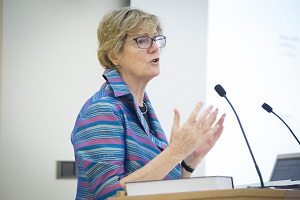 On 19 November the Royal Free London held their annual Marsden Lecture in the Sir William Wells Atrium at the Royal Free Hospital. The lecture is held in honour of William Marsden, who founded the Royal Free in 1828.
On 19 November the Royal Free London held their annual Marsden Lecture in the Sir William Wells Atrium at the Royal Free Hospital. The lecture is held in honour of William Marsden, who founded the Royal Free in 1828.
This year’s speaker was Professor Dame Sally Davies, Chief Medical Officer (CMO) and chair of the UK Clinical Research Collaboration. Dame Sally acts as the UK government’s principal medical adviser and the professional head of all directors of public health in local government.
Dame Sally spoke on the topic ‘Antimicrobial resistance – a global problem’
Talking about her time as a trainee, Dame Sally said it was “a golden age of antibiotic development”. Today, we are at risk of returning to a pre-antibiotic era, making antibiotic resistant bacteria the pressing issue of the moment.
Dame Sally discussed the current prevalence of antimicrobial resistance, saying that the number of deaths is the equivalent to a Boeing 767 dropping out of the air each week. In south east Asia alone, one child dies every five minutes from a resistant infection. There are major concerns for a future with increasing antimicrobial resistance, for example our cancer treatments are underpinned by antibiotics and one in four babies are delivered by caesarean section, during which antibiotics play an important part.
The issue goes beyond how humans use antibiotics; there is a great need to reduce animal use globally too. Over 70% of antibiotics worldwide go in to animals and in many countries, antibiotics are tipped in to fish feed, which the fish are then not able to break down, meaning the antibiotics go straight out in to the environment. They are also used in agriculture through the spraying of crops. Dame Sally described the fact that it is cheaper to use antibiotics than to instil good hygiene practices as “very worrying”.
Access versus excess is a huge issue too. While antimicrobial resistance may be growing, more people die from lack of access to antibiotics than of resistance at the present time. Discussing how much antimicrobial resistance would cost the world in mortality, Dame Sally referred to the independent Review of Antimicrobial Resistance, led by economist Lord Jim O’Neill, which showed that if nothing is done we will have more deaths from antimicrobial resistance in 2050 than from cancer.
The CMO highlighted the need for new antimicrobials, vaccines and alternative treatments – no new class of antibiotic has been discovered for 26 years. There is also a need for good sanitation and clean water, increased understanding and better diagnostics.
The CMO went on to talk about work being done to improve the current situation and help us move towards a future without antimicrobial resistance. The Fleming Fund, set up to fight drug-resistant infections worldwide by Government, will improve surveillance of drug resistant infections in the developing world and it is hoped that antimicrobial resistance will make it on to the UN General Assembly 2016 agenda.
Education and awareness is the key to the fight against antibiotic resistance and clinicians, patients and members of the public must choose to do more to ensure better understanding.
Dame Sally is a staunch supporter of ‘Antibiotic Guardian’, an awareness resource created to spread the word about antibiotic resistance and what we can do. To find out more and to choose a simple pledge about how you’ll make better use of antibiotics and help save these vital medicines from becoming obsolete, visit www.antibioticguardian.com
Watch the full lecture on the Royal Free London YouTube channel. Professor Dame Sally Davies speaks from 7:30.
ENDS
Notes to editors
For more information, please contact rf.mediaenquiries@nhs.net.
About the Royal Free London NHS Foundation Trust
The Royal Free began as a pioneering organisation and continues to play a leading role in the care of patients. Our mission is to provide world class expertise and local care. In the 21st century, the Royal Free London continues to lead improvements in healthcare.
The Royal Free London attracts patients from across the country and beyond to its specialist services in liver, kidney and bone marrow transplantation, haemophilia, renal, HIV, infectious diseases, plastic surgery, immunology, vascular surgery, cardiology, amyloidosis and scleroderma and we are a member of the academic health science partnership UCLPartners.
In July 2014 Barnet Hospital and Chase Farm Hospital became part of the Royal Free London. Read 'A bigger trust, a better future'.
 Translate
Translate
